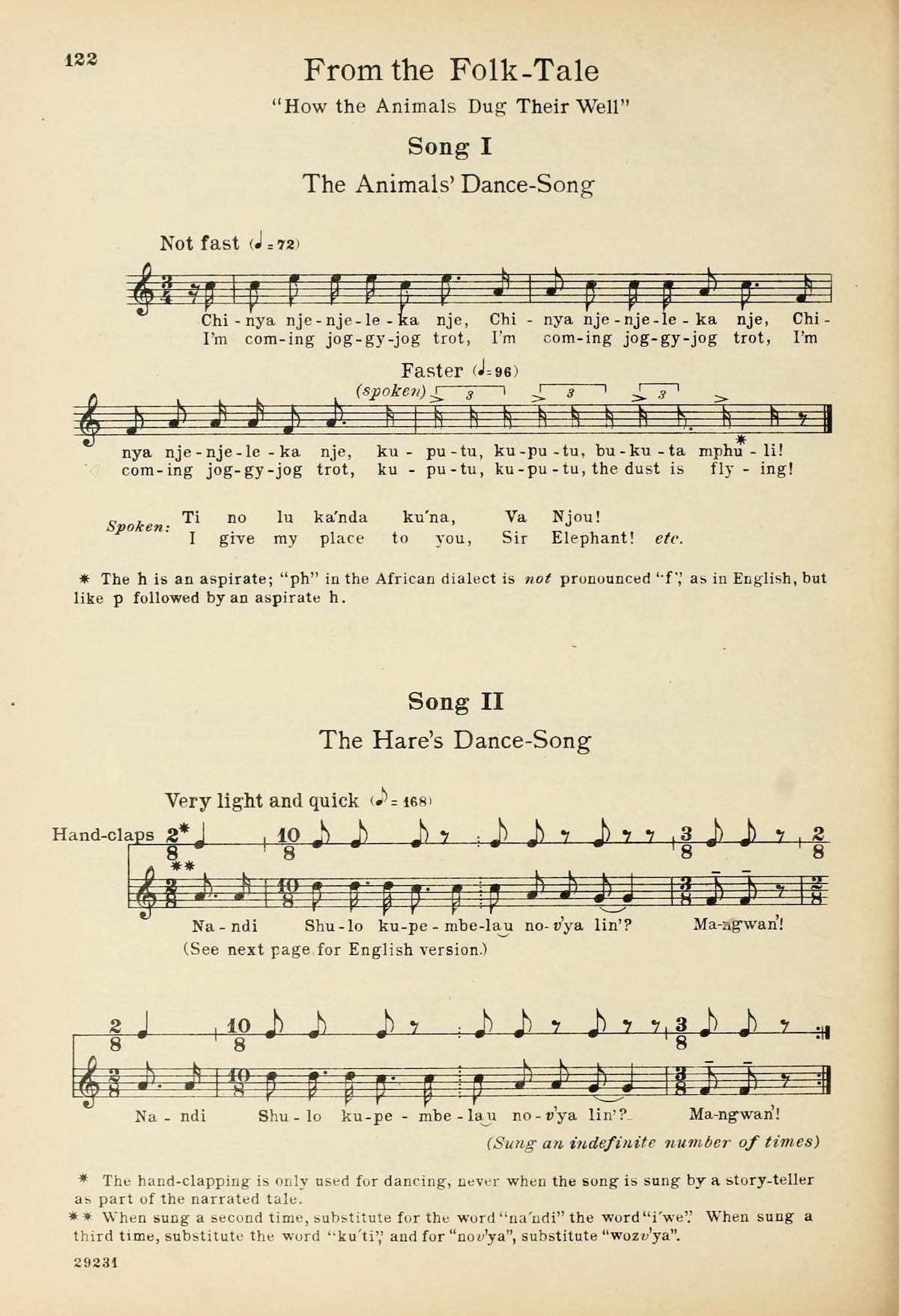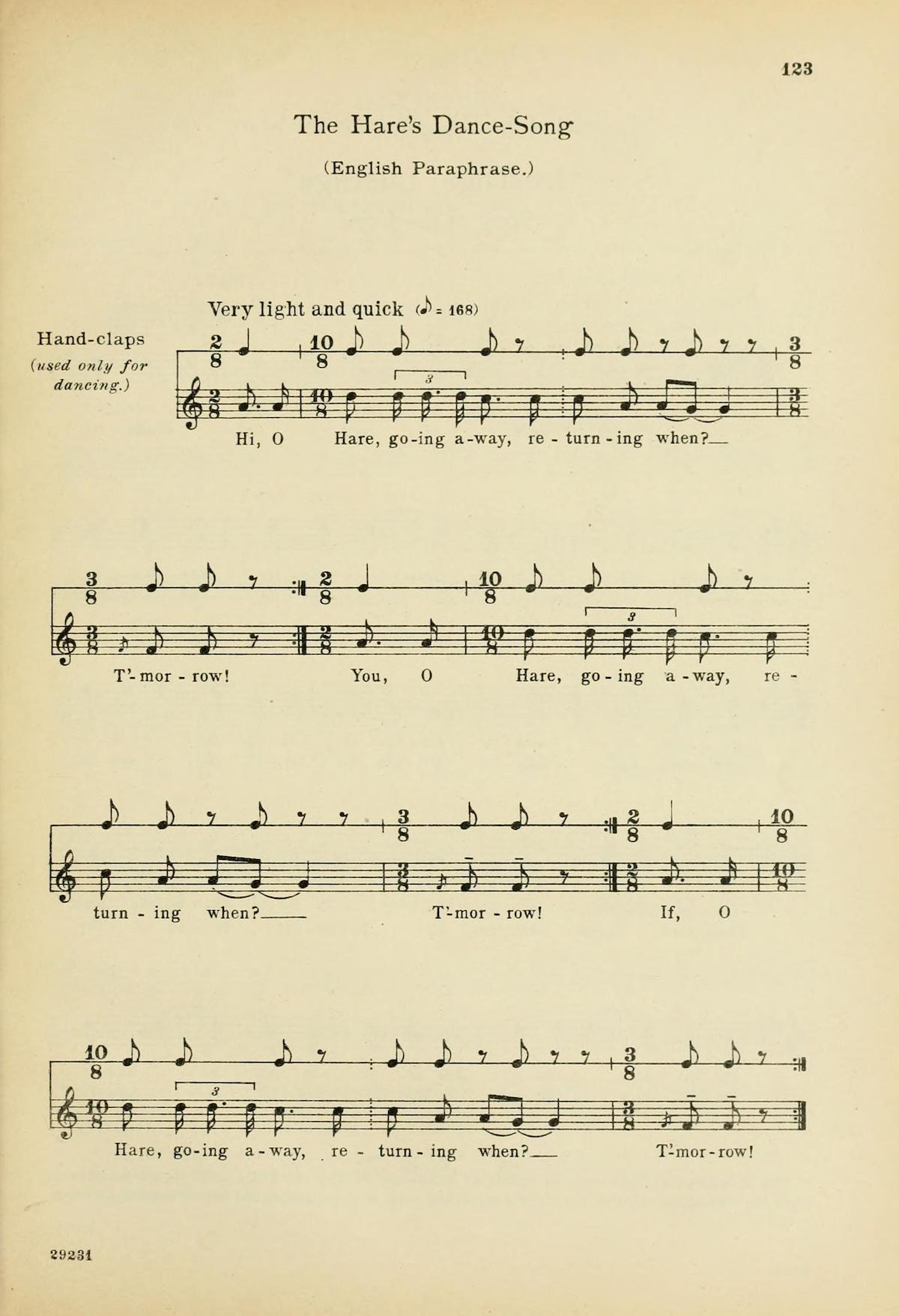[From Songs and Tales from the Dark Continent by Natalie Curtis Burlin, C. Kamba Simango (who is shown in the photograph playing a kalimba), and Madikane Čele, 1920. See item #41 in the Bibliography.]
Once there was a terrible drought. No rain fell, the lakes dried up, and the animals had no water. So Mphontholo the Lion, who was King, called all the animals together and said, “You must dig a well. Each of you must do his share and take his turn.”
But Shulo the Hare, said, “I shall not waste my time nor trouble myself with any digging. Let the others do that.” So he ran off by himself.
But the other animals all gathered to do their share; they came from many different parts of the country and each one, as he trotted in to the place chosen for the well, sang as he ran:
Chinya’nje-nje’leka nje,
Chinya’nje-nje’leka nje,
Chinya’nje-nje’leka nje.
I’m coming joggy-jog trot,
I’m coming joggy-jog trot,
I’m coming joggy-jog trot.
Then the animal began to dance, for he thought that by dancing he would kick up the ground. That was his way of digging. And as he danced he sang:
Kuputu, kuputu, bukuta mphuli!
Kuputu, kuputu, the dirt is flying!
Then he made way for the next animal, saying:
Ti no lu kanda kuna, Va Njou!
I give my place to you, Sir Elephant!
Then Njou the Elephant would dance and sing:
Chinya’nje-nje’leka nje,
Chinya’nje-nje’leka nje,
Chinya’nje-nje’leka nje.
I’m coming joggy-jog trot,
I’m coming joggy-jog trot,
I’m coming joggy-jog trot.
Kuputu, kuputu, bukuta mphuli!
Kuputu, kuputu, the dirt is flying!
At the end of his dance Njou would say:
Ti no lu kanda kuna, Va Nyati!
I give my place to you, Sir Buffalo!
Then Nyati the Buffalo would dance and sing:
Chinya’nje-nje’leka nje,
Chinya’nje-nje’leka nje,
Chinya’nje-nje’leka nje.
I’m coming joggy-jog trot,
I’m coming joggy-jog trot,
I’m coming joggy-jog trot.
Kuputu, kuputu, bukuta mphuli!
Kuputu, kuputu, the dirt is flying!
At the end of his dance Nyati would say:
Ti no lu kanda kuna, Va Shelen!
I give my place to you, Sir Bushbuck!
So it went on until all had sung and danced and dug, yet no water was in sight. Now, of course, though the animals thought they were digging, they were really only packing the earth down harder and harder by dancing in the same place.
So they all took counsel together and the King called Hamba the Tortoise, and Hamba said, “The water is under the earth.” And so instead of dancing on top of the earth, he dug down, way underneath, far into the ground, and there he found the water!
When the well was finished, the animals were very happy for they knew that they would have plenty to drink. But they also knew that they could not trust Shulo the Hare. They said, “Though Shulo would not help and has done none of the digging, we know that he will come at night and try to steal our water. ” And they said, “Each night one of us must watch the well.” And Bongo the Hyena said, “I will watch the first night. ”
Shulo, meanwhile, was planning how he could get the water, and he filled his calabash with honey and went to the well. There was Bongo just as he expected. Shulo said, as though talking to himself, “I’ve got something here so sweet that anybody who tastes it would have to be tied up before I’d give him a second taste.”
Bongo said, “Ho, Shulo! Give me some of that sweet stuff.” And Shulo dipped a stick in the calabash and smeared a little of the honey across Bongo’s mouth. Bongo licked his lips. “More!” he cried. Shulo said, “Anybody who tastes this would have to be tied up before I’d give him a second taste.” Bongo answered, “Tie me up, Shulo, but give me some more.” So the Hare tied the Hyena hand and foot, but instead of giving him any honey, he went to the well and drank all he wanted and filled his water gourds. Then he jumped into the water and splashed around; then he ran away, leaving the well all muddy and dirty.
The next night the animals set Kamba the Leopard to watch. And along came Shulo again, talking to himself and saying, “I’ve got something so sweet that anybody who tastes it would have to be tied up before I’d give him a second taste.” Kamba said, “Let me taste it, Shulo!” So Shulo smeared the Leopard’s mouth with honey and Kamba licked his whiskers and said, “More!” But Shulo answered, “Anybody who tastes this would have to be tied up before I’d give him a second taste.” Kamba said, “Tie me up as tight as you like, Shulo, but give me another taste.” So the Hare tied the Leopard, all four paws, but he never gave him any honey at all. He filled his gourds and then drank at the well; then he jumped into the water and splashed and muddied it. Then he ran away, leaving it all dirty.
The next night they set Mphofu the Antelope to watch, and when the moon was rising, along came Shulo saying, “I’ve got something so sweet that anybody who tastes it would have to be tied up before I’d give him another taste.” And Mphofu said, “Let me taste it, Shulo!” Then Shulo smeared the Antelope’s mouth with honey. Mphofu had never tasted anything like that before, and he licked his nose and said, “Give me some more!” But Shulo answered, “Anybody who tastes this would have to be tied up before I’d give him a second taste.” Mphofu too was willing to be tied up for another taste of the honey, so Shulo bound him, all four hoofs, and then he not only drank his fill at the well but bathed in the water and muddied it and ran away home.
So it happened every night, and always Shulo carried full calabashes home to his kraal and all through the drought his family had plenty to drink.
At last it came the Tortoise’s turn to watch by the well, but instead of waiting on the bank, wise Hamba the Tortoise went down into the water and lay quietly at the bottom. When Shulo saw that there was no one at the well, he laughed to himself and said, “So they have given it up! And the well is mine without any work and without any digging.” So he set his calabashes out on the rim of the well and he jumped into the water. But no sooner was he in than Hamba, who was lying quietly on the bottom, opened his mouth and snapped at Shulo’s foot. He caught Shulo and held him tight so that he could not move. When Shulo saw the fix that he was in, he said, “Is that you, Hamba? I’ve got something so sweet that I’ll let you have a taste if you want some.” He hoped that Hamba would open his mouth and let go of the Hare’s foot. But Hamba never said a word. He held Shulo tight and fast till the daylight came, and when the other animals came to the well for their morning drink, there was Shulo caught at last.
They bound him and they took him before Mphontholo the Lion to be judged. Mphontholo said, “You would not help to dig the well, but night after night you have stolen the water and made the well all muddy for the other animals. You must die.” And the Hare said, “Oh Mphontholo, oh King! If I must die, grant me first one little request. Let me sing just one little song, let me dance just one little dance before my death.” The King thought, “There can be no harm in that, for all the animals will sit around in a circle and watch Shulo so that he cannot escape.” So the Lion was merciful and granted Shulo his wish.
Then the Hare began to sing and clap his hands and he danced and sang:
Nandi Shulo kupembela-u
Novi yalin?
Mangwan!
Hi, oh Hare, going away,
Returning when?
Tomorrow!
Iwe Shulo kupembela-u
Novi yalin?
Mangwan!
You, O Hare, going away,
Returning when?
Tomorrow!
Kuti Shulo wapembela-u
Wozvi yalin?
Mangwan!
If, O Hare, going away,
Returning when?
Tomorrow!
Now the other animals, seeing Shulo dance, began to beat time to the music and to clap too, and soon they began to sing with Shulo, for it was a most irresistible song! And soon their feet began to move because they could not keep still with all the singing and clapping, and in a little while all the animals were dancing. Because of the drought, the earth was so dry that a thick cloud of dust arose from all those dancing feet, and when the animals stopped dancing, tired out — for it was a fine dance! — they could not see one another for the dust.
And when the dust cleared, where was Shulo? He had run away!


